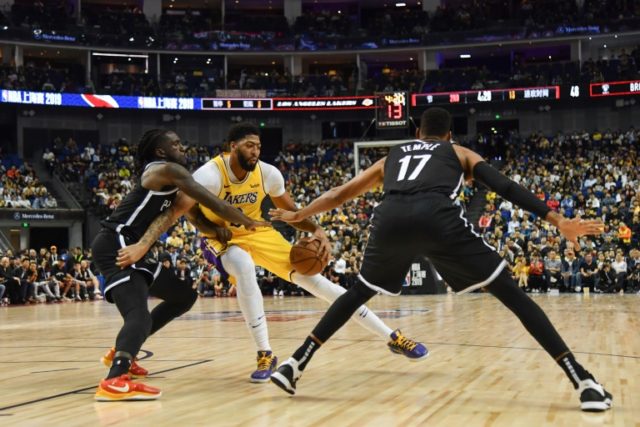Shanghai (AFP) – The NBA’s Los Angeles Lakers and Brooklyn Nets faced off Thursday before adoring Chinese fans in an exhibition game overshadowed by a free-speech row ignited when an American basketball executive expressed support for Hong Kong’s pro-democracy movement.
Questions had swirled over whether the game, the first of two planned in China, would proceed after a tweet last Friday by Houston Rockets general manager Daryl Morey thrust the world’s top basketball league into the centre of an escalating China-US dispute.
The game was not broadcast within China after plans to air it were ditched amid a general revolt by the NBA’s Chinese sponsors and partners, who severed ties with the league to protest against Morey’s stance and the NBA’s support for his freedom of expression.
Outside the game venue, a pair of protesters held up red banners reading “Fuck you Morey” and “Fuck you Adam Silver”, the NBA’s commissioner.
But amid a heavy police presence, the game got under way smoothly and tipped off in a festive mood with Chinese fans clad in NBA jerseys wildly cheering their heroes, especially Lakers superstar LeBron James.
“I’m very excited, very excited, because I can see the superstar whom I’ve been dreaming to see, LeBron James,” said fan Cai Zhicong.
“My palms are sweaty,” he added.
The game had looked in doubt after the NBA abruptly cancelled a series of publicity events in the run-up, and as authorities pulled down giant banners touting James and other players throughout Shanghai.
In an open letter released on Wednesday, a bipartisan group of US lawmakers also urged Silver and the NBA to suspend all activities in China as a principled show of support for “democratic rights”.
“It’s not unreasonable to expect American companies to put our fundamental democratic rights ahead of profit,” said the letter.
But the NBA reconfirmed the game just hours before it was to start.
An NBA representative also told AFP that there were currently “no changes” to plans for the second game of the series, scheduled for the southern city of Shenzhen on Saturday.
Amid the lingering sensitivities, however, the NBA canceled pre- and post-game press conferences at which questions over the controversy surely would have come up.
National anthems were also dispensed with, perhaps to prevent booing by fans.
Silver was not introduced and it was not clear whether he attended the game.
– Anger over free speech –
The NBA had initially responded to Morey’s now-deleted tweet — which featured an image with the message “Fight for Freedom. Stand with Hong Kong” — with statements that American politicians said were kowtowing to China.
But, under mounting pressure in the United States, Silver on Tuesday made a strong defence of Morey’s right to free speech and American values that provoked outrage in China’s state-controlled media.
“The long-held values of the NBA are to support freedom of expression, and certainly freedom of expression by members of the NBA community,” Silver said on a visit to Japan.
Outside the arena, a number of fans handed out small Chinese flags to those arriving. “We think it is necessary to express our love for our country,” said one man, who gave only his surname, Xiong.
Xiong said he was passing the flags out as a “basketball fan” and hoped to distribute 10,000.
Despite the Chinese anger, so far there has been no broad anti-NBA protest campaign on China’s government-controlled internet, nor any suggestion that the popular broadcasts in China of the NBA’s upcoming regular season are in jeopardy.
China sports industry insiders told AFP that, if the situation does not further deteriorate, the NBA was expected to weather the crisis — though likely with some financial losses — thanks to its popularity in China, where it is arguably the single most popular sports league.
Hong Kong has endured nearly four months of protests ignited by a now-scrapped plan to allow extraditions of criminal suspects to be tried in China’s opaque courts.
They snowballed into a movement calling for more democratic freedoms, the biggest challenge to China’s rule of Hong Kong since its handover from Britain in 1997.
China reacts fiercely to any questioning of its sovereignty over semi-autonomous Hong Kong, and state media has repeatedly warned foreign firms that voicing support for protesters could cost them access to China’s market of 1.4 billion people.
Apple on Thursday removed an app criticised by China for allowing protestors in Hong Kong to track police.

COMMENTS
Please let us know if you're having issues with commenting.